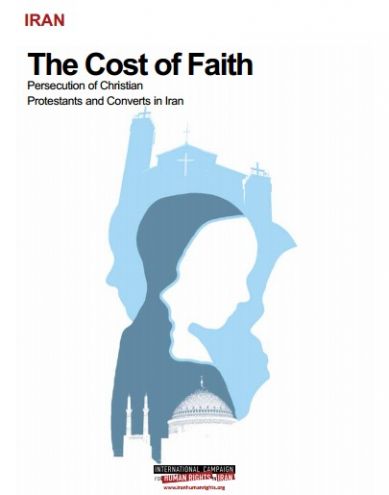Protestant converts in Iran face severe restrictions: report

Protestant converts in Iran face severe restrictions on religious practice as well as violations of the right to life through state execution for apostasy and extrajudicial killings, according to a report by a human rights organization.
The New York-based International Campaign for Human Rights in Iran released a 73-page report on Wednesday containing information from interviews with 33 Iranian Christians that took place from April to July of last year. Some interviews were from asylum seekers in Turkey while others were conducted by web video, phone and e-mail. Some chose to be interviewed on condition of anonymity.
"The egregious violations of Christians' rights, which include not only the inability to freely practice their religion, but also the threat of torture and death at the hands of state officials, go against all international law. The international community must let the Iranian government know this is unacceptable," said Hadi Ghaemi, Executive Director for the Campaign.
The report includes an introduction to Christianity in Iran, a description of policies toward house churches, international and Iranian law on freedom of religion. The section on the persecution of Protestant converts takes up the largest part of the report.
Christianity in Iran
The report, citing data from the World Christian Database, notes that there are about 270,000 Christians in Iran, far less than 1 percent of the nation's nearly 75 million people. Christians in the nation are categorized into ethnic and non-ethnic.
The majority ethnic Christians are Armenians and the Assyrians (or Chaldeans) who possess their own linguistic and cultural traditions, the report notes, with most belonging to their community's Orthodox church.
Non-ethnic Christians mostly belong to Protestant churches and most are converts who came from Muslim backgrounds, the report states. It notes the Iranian government does not recognize converts as Christians and many converts do not report their faith publicly due to fear of prosecution.
The group says that Supreme Leader Seyyed Ali Khamenei and other Iranian officials "consider Christian converts to be apostates and part of a broader foreign conspiracy aimed at undermining ideological support for the state."
Persecution
The report documents "the systematic arbitrary arrest and detention of Christian converts."
One example is Farshid Fathi, 33, a Christian leader from Tehran who was detained in December 2001 as part of a "Christmas crackdown on Christians." He was later charged with "acting against national security," "contact with enemy foreign countries," and "religious propaganda." The judiciary has sentenced him to six years in prison.
The Campaign also says that research shows that interrogators, prosecutors and courts "consistently refer to standard Christian practices, such as membership in a house church, evangelical activities, and participation in a Christian conference, as criminal acts, and security officers routinely confiscate standard Christian items such as bibles, religious literature, and crosses during arrests."
The report found that there is "clear and consistent evidence of the threat of life for Christian converts.
It refers to the execution of Christian pastor Hossein Soodmand for apostasy in 1990. It also notes church leaders sentenced to death for apostasy, including Christian pastor Youcef Nadarkhani, who was eventually released after strong international pressure.
There were also "numerous reports of security officials threatening Christian detainees with execution," the report noted.
There were also "numerous cases of suspicious deaths involving Christian leaders whose investigations were so lacking in due diligence that government complicity in the killings or the cover-ups is strongly suggested."
Read the International Campaign for Human Rights in Iran's report: The Cost of Faith Persecution of Christian Protestants and Converts in Iran